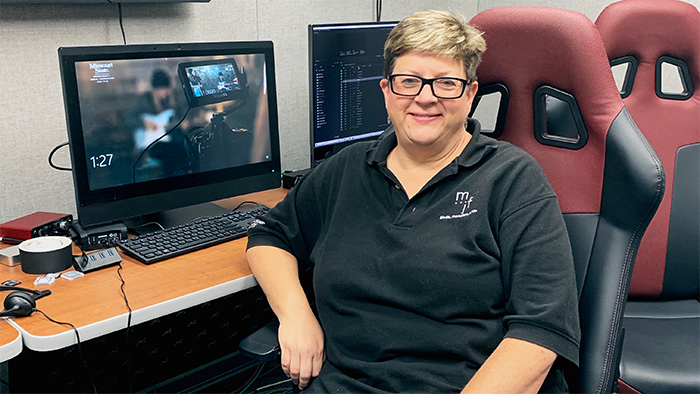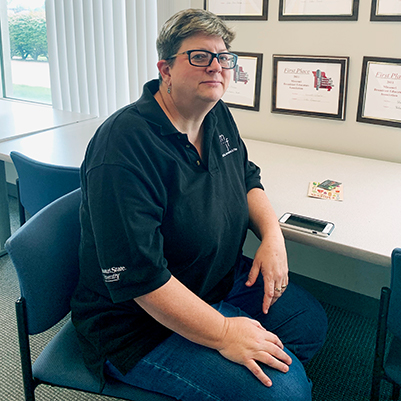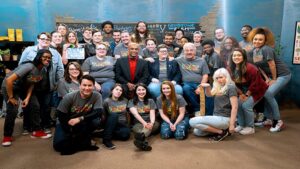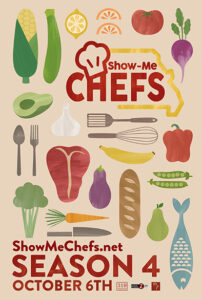
One year ago this past September, I met Dr. Deborah Larson practically in passing when she was in the throws of post-production for the Season 3 premiere of “Show-Me Chefs.” This was long before I ever imagined I would GoMaroon within the next calendar year by joining the staff of the College of Arts and Letters, back when I was simply appeasing my mother by accompanying her to visit her alma matter, Missouri State University.
While Larson was charming, entertaining, and delightful at the time, I doubted our encounter would make a lasting impression simply because of the all-consuming tsunami that is post-production.
I never would have expected that a year later, when I emailed her to request an interview about Season 4’s premiere, she would recall meeting me in 2018. When I received her response to schedule our interview, Larson closed the email with, “I think we did meet in the control room in Strong Hall last spring when your mom was visiting.”
And, she was right. My mother and I were being given the full COAL tour with an emphasis on the media, journalism, and film facilities. This was my mom’s way of giving me a not-so-subtle nudge in the direction of graduate school while also acknowledging the many years I had spent working in film and television production.
As I entered Strong Hall on my way to meet Larson once again, I realized that, a year prior, my elitist, metropolitan prejudices against Springfield and Missouri had caused me to tune out most of the places and events I visited the first days of that visit. I dashed toward each new door like a deranged chipmunk and punched Larson’s number into my phone, anxiety growing as the seconds grew into wasted minutes of her very precious time. I took a deep breath, as I digested the bitter pill of my self-realization and regret. Then, I recognized the glass doors labeled “Ozarks Public Television (OPT).”
I peered through the glass as I reached for the handle, and there, in the center-most point of the room, at the center-most seat, at the center-most table, sat the creator and executive producer of “Show-Me Chefs.”
Larson is not exactly intimidating, but without question she exudes an aura of authority, collected calm, and expertise.
We greeted each other. I babbled on for a moment about my stupefied 24 frame expedition at Strong Hall in an attempt to apologize for the 180 second lag in my arrival time.
Silence.
Then Larson’s laughter filled the room. I instantly felt as though we were old friends getting together to reminisce about the good ol’ days. And for the next hour and change, we talked shop as though we had been long-time production buddies.
The vigor and vibrancy with which Deborah Larson speaks about “Show-Me Chefs,” her colleagues, her experience, and, most importantly, her students, is energizing and refreshing. It was hypnotizing, magnetic, and electric all at once.
Between two producers: A conversation in a swirling vortex, multi-media, content-creating, television and filmmaking incubator.

CN: How did “Show-Me Chefs” come about in the first place?
DL: We had shot a web series at a new event venue downtown called 319 DownTown, located on the corner of south Campbell and Walnut streets. I was location scouting. I needed a place to stage as a casino. I walked into this empty space, and it was perfect. I knew we could create a casino there. And so we did.
During our shoot, the owner, Shawn Gott, and his manager, Angelo Wannithantri, were hovering around me, and they were like, “you know, you really need to do a cooking show.”
Then, the next year rolled around, and I still had my advanced multi-cam class. And that’s when I started to think, “maybe we should do that cooking show.” So, I went back down there.
Shawn had the facilities, kitchen equipment, and kitchen, Angelo had the food knowledge, and I had the media stuff and students. So, we put it all together and we did that.
We were at 319 for three seasons and then during Season 3, Shawn was building a new event center, Grey Rocks, with this big, beautiful kitchen, like a major double kitchen, and it was perfect. And so we just moved on over to Grey Rocks for Season 4, and we’ll shoot Season 5 there as well.
CN: And Season 5 is going to be the final season?
DL: That’s what I say. It’ll be All-Stars. Or it’ll be All-Stars versus new team members. We think we’re going to do four teams of three, and then, the losing teams will have to be the ones that do the sort of restaurant wars to help us raise money. Then, two people from those teams will make it back into the show. So, we’ll see. You know?
It’s really incredible because this next season [Season 5] will take the next year and a half of my life. Easy. I’ve realized that without question this is really more of a 24 month long process than an 18 month one. I always say it’s 18 months, but here we are still working on Season 4.
People don’t realize that, you know? The public always thinks, “Oh! Do you have an audience? Can we come and watch,” because they think they’re gonna come and watch an hour show. They don’t really understand the filming process and what it takes to do it. We’ve long wanted to have an audience, but it’s just not feasible with a closed set, I don’t think.
CN: It adds so much variability.
DL: It really does. And I think that was one of the things Shawn wanted to do. He thought that if we were able to get an audience in there that that would be really great marketing for him. And that they could sell tickets, and he would feed them, and then after those people could watch the show. I don’t think he really understood what it takes to do the show. He knows now, of course. So, he quit bugging me with the, “hey, don’t you want to put an audience in here?” And, no. I don’t [want an audience], ’cause they’ll be on their phones and not paying attention in 30 minutes. After Round 1, they’ll be bored.
We tried a pilot one time with an audience, and it went really badly. They all had their laptops out halfway through the cooking round. I was like…Really?!
We announced, “you all have to put your laptops up. You have to be off your phones, ’cause if we [the cameras] see you, there it is [on screen.]” And, you know, they were all grumbling and they got up and left. That’s when I decided we’re not doing that again. Ever.
CN: Yeah, it’s a whole different can of worms.
DB: Right. It is a whole can of worms. This season, Season 5, though we’re gonna do team stuff, which we haven’t done before. We don’t know how the chefs will feel about that, but it should add some dimension. Right now, we’re really trying to figure out what that team stuff is gonna be. Is it gonna be at Grey Rocks? Or do we get out and work in the community to do some other stuff? Maybe do a food truck thing. That would be fun.
CN: That would be fun. And give you a whole new environment.
DL: Exactly. Any chef who has worked on food trucks – no problem for them. Any chef, who say, is coming from a country club and is used to a bigger kitchen, they’re not gonna do that great – I mean, they have big commercial kitchens. And with a team of three…no room to even move, right?
CN: It certainly adds new dynamics and conflict.
DL: It does! But…we also can’t really get in there and film either, so we’ll just have to do it on GoPros. Which is fine.
In fact, I was talking to Larry, over at Ozarks Empire Fair, and he was like, “yeah, we got a food truck you guys could use.” Of course, I made sure he understands we don’t have any money, and he still said, “eh. Okay. We don’t care.” I mean, they make so much money over there. They’ve always got stuff going on. So, there’s that.
We’re talking now to Fellers, and other places, about using their kitchens for a team challenge, like maybe breaking down a side of beef or something. Team knife skills or something like that. I mean, we’ve gotta get somebody to give us a side of beef, too, ’cause we can’t really afford that, either…
So, obviously, we’re always looking for commercial and business partners who will allow us to do things without paying them because we don’t have any money.
We’re just trying to come up with some new ideas, finish with a bang, bring in some team dynamics, and kind of go from there. And, you know, as a producer, I want to bring in all of the big personalities. But, it’s always the big personalities who are the most high maintenance.
CN: Yes. 100 percent.
DL: And it’s all the chefs who are super sweet, focused, and no problems – they’re the ones you want to work with, but they’re not good television.
So, there’s this sort of balance of who are we gonna cast? Who’s willing to do it? And, you know, do we put up with this personality or that personality?
CN: Which ones are the more easily managed of the personalities and what kind of draw do they bring?
DL: Right. But, it is very interesting how the characters sort of reveal themselves in editing, you know?
CN: Absolutely.
DL: You see who each person really is, you know? As producers, we may have felt it, but the editors really sort of bring that out.
CN: Obviously, I know you’re the producer and creator of “Show-Me Chefs.” Then, is the rest of the production crew all students?
DL: Aside from Angelo, who is the head judge. And then I brought in my head gaffer, Paul, who used to be our chief engineer here. Paul retired two years ago now, and I find enough money for him to come and help. Last season was his first time with us not as an employee of MSU. But, he’s always been on set to basically be our engineer and troubleshooter with our systems, and also our camera and lighting sources. But, he comes up with our lighting designs.
CN: A good gaffer is…
DL: Worth his weight in gold.
CN: Yeah. Don’t skimp on that guy!
DL: So, he oversees the lighting, for sure, and some other things. But, the kids pretty much know what they’re doing. And then, usually, I’ll have a director that emerges from the class, like when it’s clear they’re ready. The last three seasons, I’ve had women directors, which has been great.

CN: That’s fantastic. That’s super awesome!
DL: In Season 2, I had two male directors, Taye and Alfredo. They each did great, but their styles were very different, and trading off was confusing for the crew. That experience taught me we should only have one director for consistency.
So, mainly, it’s been women producers and women directors. Women have really been in charge of this show for most of it. I do have two men producers this year, and they’re doing a good job. We just sort of divide up the producing stuff. Some of them do better going in and interfacing with the farmers and talking to them about their products, and some are better at other stuff, you know.
And then there’s Loreli Adams, she’s been my main producer, and she’s a graduate student. She’s super close to graduating, too. So, she will probably come back in as one of the main producers because she’s super good with the producing stuff.
I also have another guy who’s great with post-production. And he was my main editor this last summer. He didn’t know what he was getting into, but he really took to it. He’s my GA for media120. He’ll oversee post.
But, the thing is, with the show, and I mention all of the producers, but you know, we also have to produce 35 [production] packages for the series as well.
CN: That’s a lot of packages.
DL: So, we never have enough time to shoot them out during the semester, which means we’ve been shooting them over the summer while we’re trying to start post, and it’s usually all the same people. So, we’re getting started late on post because we’re out shooting on the farms that are an hour and sometimes more away from here.
Since we’re a public affairs university, the whole idea of getting into the community, getting out and talking to those farmers, and highlighting what we do well here in this region, and what their products are and why people should eat locally, it’s all really good educational stuff. It’s just a lot of work.
We’re not just making entertainment television, we’re making educational entertainment. And I’ve always kind of been into the “edutainment” part of it.
I mean, for me, that’s just everything. Expose people to places they haven’t heard of. Or, you know, if they happen to go across the block and they’re like, “Oh my god, there’s that place we happened to see on the TV show. We should go eat there.” I mean, there are some really talented people working in the culinary arts here.
CN: Absolutely.
DL: For Season 5, I’ve tried to put us on a different track. Next spring, we’re not going to shoot the show over spring break – even though the students don’t mind that. They kinda like it. I’m the person with the attitude problem. I never get a break. Because the fact of the matter is, as showrunner, it never stops for me.
CN: Are you shooting in, god forbid, 4k?
DL: We’re shooting in 1080. We just don’t have the room to be shooting in 4k. And there’s no reason to do it, especially for the web.
CN: And you can’t see past 2k.
DL: No, you can’t. The only thing we shoot in 4k are the GoPros, so we can zoom in on stuff.
CN: Right! That’s the only reason to do it!
DL: Exactly. It just takes up too much space and we already take up so much of our department’s server. They’re just like, “oh god, Show-Me Chefs is just…AHHH!” You know?
CN: Uh-huh. That’s another thing people don’t realize – just how much data 4k takes.
DL: Some of these kids want to shoot in 4k. And I just ask them, “Why? What are you going to do with that? Put it on the web? What are you doing?”
CN: Where are you showing it in 4k? And who’s gonna see it in 4k? Oh…right…NOBODY…because our eyes can’t see it.
DL: Exactly. You know, it’s just ridiculous. But we [the faculty] are getting better all the time because we’re really making the students think about why they need this equipment or that equipment and what they’re using it for. Really make them think about their shots and what they’re doing.
I think my colleagues…my colleagues are great. And they really look forward to talking to these guys about this kind of stuff. Because they’ve all been in the industry to know that it’s all about the money. You have to be able to know what you need, when you need it, why you need, and how long you need it for.
CN: That’s so important. I know, it sounds kind of ridiculous, but seriously, it’s a true skill, to be releasing your students into the world with, the ability to determine what they really need from what they want.
Okay, back to “Show-Me Chefs.” How many episodes do you do?
DL: We normally do seven. We do quarter rounds, and then semi-finals, and then finals. But, for Season 5, we’re talking about 10. Start with the team set-up and then whittle down who the challengers will be.
CN: So, it’s kind of a slightly extended final season?
DL: Yes. For me, right now, it’s just three more major headaches…I’m burnt out. Can you tell?
CN: I always say that every day of production is like planning a wedding.
DL: It is! I’m telling you though, for me, production is the easy part. Yes, getting there is hard. But, production is easy, even if it’s hard. Even if you’re there at 6 o’clock in the morning and you don’t leave till 8 p.m. or 9 p.m. or 10 p.m. or whatever. You get over that, right? I mean, it goes on for a week, and then you’re done. It’s the post thing that just drives me crazy. It’s doing that now, if you can’t tell. ‘Cause I feel like this should have been done in September. Well, actually, it should have been done before school started.
My poor students who are actually finishing it, I mean, they have no lives. They’re not getting their work done. They’re not getting any sleep, either.
So, it’s not just me.
CN: Useful training for the real world. I know it’s horrible, but it’s true.
DL: Well, it is, and yet it’s different for them because they also have other jobs and other classes and things that they have to get accomplished. If this were just their job, they’d be all in. It wouldn’t be a problem. They’d be eating, living, and breathing it, and getting paid to do it. Right now, they’re paying us to do it, and have a lot of other things they need to be doing, too.
CN: It seems like it’s a really good test to see how much you really love it.
DL: And how much you want to do it.
CN: For sure. Because coming from indie film, where there are often periods where there’s quite literally no money, you’re likely to find yourself in that same position. So, how much do you really love it? How much do you really want to do it? In that respect, it’s really good test.
DL: It is a good test, because if they love it, they’ll do it.
CN: From the bit I’ve seen, it seems like you guys are teaching them how to make some excellent quality work. And right now, reality is where most of the jobs are.
DL: Exactly. This is a great opportunity for these guys. Nobody else in the country is doing this. Nobody. I mean, sure, universities do television shows, but they’re usually talking-head, video roll-in shows, or they’re sports shows, or they’re newscasts. They’re not doing THIS – which is a huge, big thing.
Over the four seasons, we’ve now had over 200 students work on this project. One of my developers, who was one of my main producers for the first two seasons, he got a job on “The Bachelor.” The girl, Sami, who directed Season 3, she just got a job on “Top Chef.”
Multiple other students are out in L.A. doing television, some of them are working for Disney, some are doing other stuff, but mostly program-related stuff.
CN: Wow. I mean, you’re talking about some really competitive areas in the entertainment industry which is already really competitive.
DL: Very competitive. And we’re really proud of them.
I think our program’s doing some really good stuff.
We’ve got students, or alums rather, working in Atlanta that are working in the lighting and camera departments on shows and they’re doing super great. We have people in New York that are on film sets and television and they’re doing great. It’s all about work ethic.
CN: It’s work ethic and knowing your technical stuff.
DL: Well, yeah. You have to know your technical stuff in your field.
CN: And there are a lot of people who start out not knowing that.
DL: That is true. And that’s amazing to me.
We’re really proud of our alum base and it’s getting bigger and better all the time.
And, you know, there are lots of students who go back to St. Louis or Kansas City and work with production companies or work for businesses and do their multimedia stuff. They might not be in film or television in a big way, but they use it in what they’re gonna be doing. And, of course, there are some of them who don’t use it at all, and that’s okay, too.
CN: Well, you all are doing some excellent work. So excellent, in fact, I understand you’ve won some regional and national college Emmy awards.
DL: Last year [2018, for Season 3], we were up for and won the Broadcast Education Association – Festival of Media Arts in Studio: multi-camera or live-to-tape. We also won two college Emmys from The National Academy of Academy Television Arts & Science – Mid-West Region which encompasses five states.
We’ve also won multiple Tellys and other awards for a total of 14 over the course of the four seasons.
So, Season 2 we were up for, but did not win the national college Emmy from The Academy of Television Arts and Science (ATAS). But, one of three across the nation, or around the nation…it’s not that bad.
CN: No. It’s not bad at all!
DL: Of course, we think we should have won, but everybody says that. But, truthfully, we should have won. Our competition was just not as good as we were.

CN: Okay, so finally, what can people anticipate about Season 4?
DL: The season about to air? Well, we teamed with Hotel Vandivort, The Order, actually. And their head mixologist, Mary, comes and does a pairing for us for a few rounds. I think she did a cocktail round and the appetizer round and then we paired up [the other rounds] with other drinks; coffee and teas and desserts, beers and wines and entrees. So, we have a pairings corner, basically. And we have some trivia questions. Our co-hosts are male this year, and we’ve always had female hosts before. We’ve got some great writing. Our writer was really excellent this season. And our talent is really great. Our chefs have big personalities – most of them have big personalities.
CN: Sure. Better television.
Your Season 4 premiere airs this Sunday, Oct. 6, [2019] at 5:00 p.m. on channel…
DL: Channel 27. KOZL-TV, yes. Then, we’ll release it online at 6 o’clock that same night on showmechefs.net.
Deborah Larson is an associate professor in the department of media, journalism and film at Missouri State University. She has won awards for both her production work in the entertainment industry and for the excellent quality of education she provides her students, and currently serves as the executive producer of “Show-Me Chefs.”
As of 3:50 p.m. on Oct. 13, 2019, corrections were made and are indicated in italics in the Q&A regarding the following: former directors and “Show-Me Chef” alumni, “Show-Me Chefs” nominations and awards.
